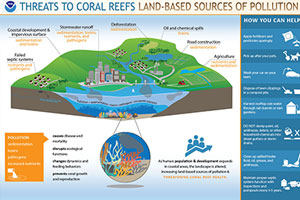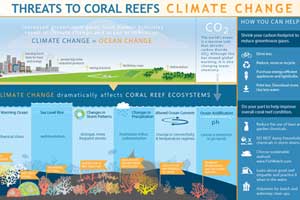How does overfishing threaten coral reefs?
Overfishing can deplete key reef species and damage coral habitat.

Coral reef fish are a significant food source for over a billion people worldwide. Many coastal and island communities depend on coral reef fisheries for their economic, social, and cultural benefits. But too much of a good thing can be bad for coral reefs. Download this infographic | Infographic Text
Coral reef ecosystems support important commercial, recreational, and subsistence fishery resources in the U.S and its territories. Fishing also plays a central social and cultural role in many island and coastal communities, where it is often a critical source of food and income.
The impacts from unsustainable fishing on coral reef areas can lead to the depletion of key reef species in many locations. Such losses often have a ripple effect, not just on the coral reef ecosystems themselves, but also on the local economies that depend on them. Additionally, certain types of fishing gear can inflict serious physical damage to coral reefs, seagrass beds, and other important marine habitats.
Coral reef fisheries, though often relatively small in scale, may have disproportionately large impacts on the ecosystem if conducted unsustainably. Rapid human population growth, increased demand, use of more efficient fishery technologies, and inadequate management and enforcement have led to the depletion of key reef species and habitat damage in many locations.
Infographic Text
Threats to coral reefs: Overfishing
Coral reef fish are a significant food source for over billion people worldwide. Many coastal and island communities depend on coral reef fisheries for their economic, social, and culture benefits. But too much of a good thing can be bad for coral reefs.
Fishing Nurseries
Nearshore habitats serve as nurseries for many fish. Catching young fish in nets removes them before they can help replenish the population.Marine Debris
Traps set too close to reefs and marine debris, such as ghost traps lost nets, monofilament, and lines can damage coral reefs, which take a long time to recover.Indiscriminate Fishing
Use of non-selective gears, like nets and traps, often removes more herbivorous fishes. These fish eat algae and help keep the ecosystem in balance.Fishing Spawning Aggregations
Some species gather in large numbers at predictable times and locations to mate. Spawning aggregations are particularly vulnerable to overfishing.Fishing Too Many Big Fish
Large fish produce more young that are likely to survive to adulthood. Their absence means fish populations dwindle over time.
How you can help
- Educate yourself on local fishing rules and regulations. Your state fishery agency or bait and tackle shop can help you learn more.
- Make sustainable seafood choice. Learn more: www.fishwatch.gov
- Only take what you need. Catch and release fish that you don't plan to eat.
- Be a responsible aguarium owner. Know where your fish come from and DO NOT release unwanted fish into the wild.
Search Our Facts
Get Social
More Information
Last updated: 01/20/23
Author: NOAA
How to cite this article

